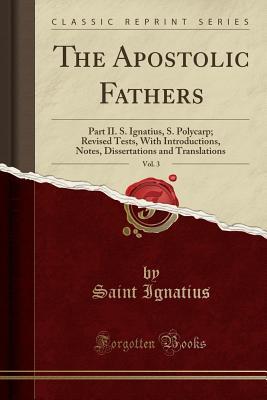- Bíblia
- Leia a Bíblia
- Versões da Bíblia
- Verso do dia
- Planos de Leitura
- Versos por Tópico
- Books of the Bible
- Imagens bíblicas
- Estude
- Comentários
- Concordâncias
- Dicionários
- Enciclopédias
- Sermões
- Bible Atlas & Maps
- BP Wiki
- Devocionais
- Devocionais de hoje
- Light of the World
- Todos os devocionais
- Inspirational Quotes
- Mais
- Picture Quotes
- Videos
- Inspirador
- Estudo da Bíblia
- O que a Bíblia diz
- Bible Q&As
- Daily Bread
- Bible by Genre
- Bible Stories
- Random Bible Verse
- Comunidade
- Store
The Apostolic Fathers, Vol. 3: Part II. S. Ignatius, S. Polycarp; Revised Tests, with Introductions, Notes, Dissertations and Translations (Classic Reprint)
by Ignatius of Antioch
Excerpt from The Apostolic Fathers, Vol. 3: Part II. S. Ignatius, S. Polycarp; Revised Tests, With Introductions, Notes, Dissertations and Translations
Of the extant M5 L1 I have made an entirely new collation. That this was not super uous the facts will show. The MS was transcribed in the first instance for Ussher, and (till I myself collated it) had only been collated twice for subsequent editions 1. Of the numberless inac curacies of the transcript from which Ussher derived all his knowledge of this Ms I have already spoken. Moreover he has not (except in a very few instances) distinguished the respective readings of the two mss which he employed. And lastly, his printed text contains several readings which are not found in either, and which (in some instances at least) have slipped in through mere inadvertence.
About the Publisher
Forgotten Books publishes hundreds of thousands of rare and classic books. Find more at www.forgottenbooks.comwww.forgottenbooks.com
This book is a reproduction of an important historical work. Forgotten Books uses state-of-the-art technology to digitally reconstruct the work, preserving the original format whilst repairing imperfections present in the aged copy. In rare cases, an imperfection in the original, such as a blemish or missing page, may be replicated in our edition. We do, however, repair the vast majority of imperfections successfully; any imperfections that remain are intentionally left to preserve the state of such historical works."
Of the extant M5 L1 I have made an entirely new collation. That this was not super uous the facts will show. The MS was transcribed in the first instance for Ussher, and (till I myself collated it) had only been collated twice for subsequent editions 1. Of the numberless inac curacies of the transcript from which Ussher derived all his knowledge of this Ms I have already spoken. Moreover he has not (except in a very few instances) distinguished the respective readings of the two mss which he employed. And lastly, his printed text contains several readings which are not found in either, and which (in some instances at least) have slipped in through mere inadvertence.
About the Publisher
Forgotten Books publishes hundreds of thousands of rare and classic books. Find more at www.forgottenbooks.comwww.forgottenbooks.com
This book is a reproduction of an important historical work. Forgotten Books uses state-of-the-art technology to digitally reconstruct the work, preserving the original format whilst repairing imperfections present in the aged copy. In rare cases, an imperfection in the original, such as a blemish or missing page, may be replicated in our edition. We do, however, repair the vast majority of imperfections successfully; any imperfections that remain are intentionally left to preserve the state of such historical works."
BUY NOW
Paperback, 542 pages
Published November 25th 2018 by Forgotten Books
Se inscrever
© 2025 Bibleportal.com Todos os direitos reservados.

St. Ignatius of Antioch (35 -117)
(Ancient Greek: Ἰγνάτιος Ἀντιοχείας, Ignátios Antiokheías; ad c. 35 or 50 – 98 to 117), also known as Ignatius Theophorus (Ιγνάτιος ὁ Θεοφόρος, Ignátios ho Theophóros, lit. "the God-bearing"), was a student of John the Apostle, was the third bishop of Antioch, and is now counted among the Apostolic Fathers of the Christian Church.[En route to Rome, where according to Christian tradition he met his martyrdom by being fed to wild beasts, he wrote a series of letters which have been preserved as an example of very early Christian theology. Important topics addressed in these letters include ecclesiology, the sacraments, and the role of bishops. Ignatius modeled his writings after Paul, Peter, and John, and even quoted or paraphrased their own works freely, such as when he quoted 1 Cor 1:18, in his letter to the Ephesians.
... Show more